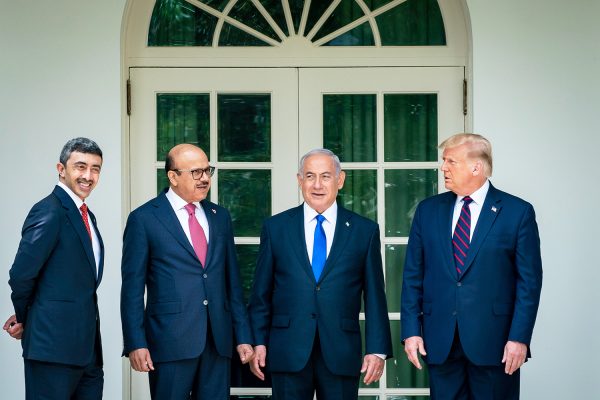
I haven’t been Donald Trump’s greatest fan, but for once he deserves praise: for facilitating the normalization of ties between Israel and two of its Arab neighbors.
In a treaty signed at the White House on Tuesday, Bahrain and the United Arab Emirates entered into diplomatic relations with the Jewish state for the first time.
Only Egypt and Jordan had so far. Other Arab states do not accept Israeli passports and do not exchange embassies with Tel Aviv.
We don’t know how involved Trump was in the negotiations, and the agreements fall short of what he calls a “peace deal”. The countries weren’t at war.
But it’s a significant step and a welcome departure from previous presidents, who allowed the Palestinians a veto over Arab-Israeli relations.
Palestinian veto
Arab states for decades conditioned recognition of Israel on a peace treaty with the Palestinians, but the Palestinian rejected every possibility of peace — from the 1947 UN partition plan to the 2000 Camp David negotiations to Israeli prime minister Ehud Olmert’s offer of land swaps and shared control of Jerusalem in 2008.
American presidents from Bill Clinton to George W. Bush to Barack Obama nevertheless tried to find equidistance between a reliable American ally and an intransigent Palestinian leadership. This only encouraged the Palestinians to hold out in hope of a better deal.
Trump has made clear there isn’t one. His “peace plan” leans too far in the other direction. As Ariel Reichard has written here, it fails to take the wishes of Palestinians into account altogether, who predictably rejected it.
But the plan, and the United States moving its embassy from Tel Aviv to Jerusalem, did signal to Palestinian leaders that America’s patience has worn thin and that the best they can hope for is a partly demilitarized state in the West Bank.
Other Arabs got the message. Palestinian objections seem to have fallen on dear ears in Manama and the six emirates of the UAE; states which, not coincidentally, owe their security to the United States. Without American protection, they would be playthings in the regional struggle for hegemony between Iran and Saudi Arabia.
If the Palestinians still hoped that — despite burgeoning commercial ties and security cooperation between Israel and its neighbors — other Arabs would somehow convince or pressure Israel to make them a better offer, Trump’s actions, if nothing else, have buried that hope. The Middle East is moving on.
Dictators before friends
If only Trump treated America’s other democratic allies as well as Israel.
Rather, as he admitted to veteran journalist Bob Woodward, he gets along better with dictators:
It’s funny, the relationships I have — the tougher and meaner they are, the better I get along with them. You know? Explain that to me someday, OK?
Trump withdrew American troops from Syria, giving Turkey’s Recep Tayyip Erdoğan permission to hunt down the very Kurds who had fought alongside the West against the self-proclaimed Islamic State.
He flattered Kim Jong-un but didn’t change North Korean behavior. The country still maintains a rogue nuclear program and routinely threatens its democratic neighbor to the south — which Trump wants to pay for America’s protection.
He had done nothing to rein in the brutal Saudi-led war in Yemen, even after Saudi journalist Jamal Khashoggi was murdered in the kingdom’s embassy in Istanbul. Trump even vetoed a Republican-backed resolution to end American military support for the war and invoked emergency powers to bypass Congress and sell billions of dollars worth of weapons to the Saudis.
Trump has given Vladimir Putin almost everything he wanted: division in the Atlantic alliance, ceding Syria to Russia, withdrawing from the Intermediate-Range Nuclear Forces Treaty and allowing New START to lapse.
He claims to take a hard line on China but hasn’t. Trump’s tariffs destroyed some 300,000 jobs even before the pandemic and necessitated $28 billion in farm bailouts. He withdrew the United States from the Trans Pacific Partnership, which would have cemented American leadership in the Pacific and put pressure on China to improve legal protections for foreign companies and investors and respect intellectual property rights. Trump didn’t speak out for the freedom of Hong Kong, much less do anything when China absorbed it. He hasn’t spoken out for the Uighurs, China’s persecuted Muslim minority. John Bolton, Trump’s former national security advisors, claims the president encouraged Xi Jinping to lock up millions of Uighurs in concentration camps!
